
Mar 24, 2019 | Columns, Fashion
By Kristine Fu ’19
During this bleak winter season, comfort is the priority. Many girls are sporting cozy shearling jackets and teddy coats to stay warm. Though, despite the winter aesthetic of oversized sweaters and leggings, there are many exciting fashion trends on the rise at Pingry. What was once dismissed as kitschy and gaudy is making a comeback; animal prints have been spotted on skirts, turtlenecks, and even phone cases! Pair your favorite basic sweater with a leopard print skirt or finish a monochromatic outfit with faux snakeskin shoes. On a night out, wear a leopard print coat with heels for the “city-girl look.”
With the spring season only a few weeks away, it’s time to break out the Lilly Pulitzer dresses and pastel skirts, as this year’s spring trends are reminiscent of Sixties fashion. The counterculture of the 1960’s represented a rebellion against the values of traditional society. During this time of social upheaval, mainstream fashion was radically changed with the emergence of Bohemian fashion. The same trends of flared sleeves, fringe jackets, and flowy peasant dresses can be seen at today’s popular clothing stores, such as Free People and Forever 21. Embrace the Boho-chic style with floral print dresses and embroidered denim jackets. For a comfortable and stylish outfit, wear a pair of flowy and flared pants with a plain tee-shirt.
With the revival of Sixties Mod, you’ll be seeing lots of brightly-colored culottes and tweed tops this spring. If you’re looking for the essential mini dress, find one with a fun and flirty print, like polka dots or colored stripes. Though once regarded as a fashion faux pas, mixing prints is in vogue once again. So, don’t be afraid to experiment with the broad color palette. This was the era of bold, innovative, and creative fashion that broke all the rules and created new trends. English model, Twiggy, popularized the plaid mini skirt, which had initially shocked the public. Leopard print was born in the wardrobe of the first lady and Sixties fashion icon, Jackie Kennedy. Yves Saint Laurent’s knee-high boots demonstrated that fashion had both functional and aesthetic value.
As the Italian designer Elsa Schiaparelli once said, “In difficult times, fashion is always outrageous.” Whether it is mixing prints or trying a vintage trend, take a fashion risk this season to find your own style. The values of individuality and self-discovery were fundamental to the counterculture revolution.
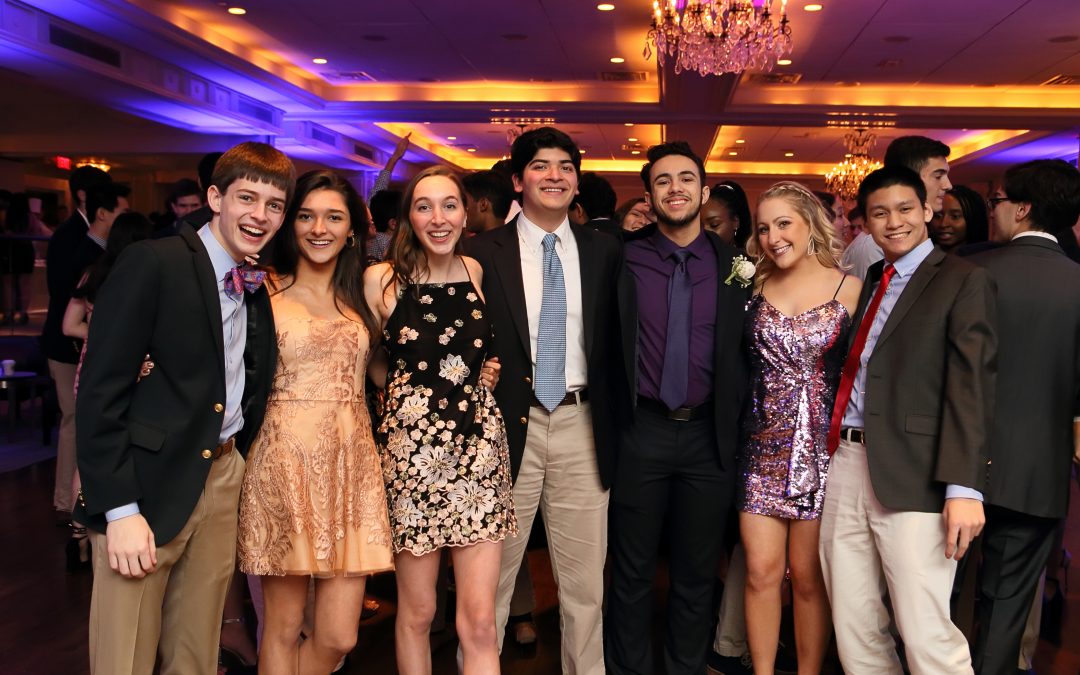
Mar 24, 2019 | Meghan Durkin, School News
By Meghan Durkin ’21
On Saturday, January 26, students arrived at The Westin Governor Morris in Morristown, NJ for Pingry’s annual winter dance, Snowball. Snowball is a “Sadie Hawkins”-style dance, in which girls traditionally ask boys to attend the dance with them. Students, dressed in formal attire, filled the hotel for a night of dancing, music, and friendship.
Last year, The Westin served as the location for Snowball for the first time. The venue turned out to be a terrific space, with a large dance floor, spacious lobby, and plenty of dining tables for students. Because it was so well-received by the community, Student Government decided to hold the dance at The Westin again. Upon arrival, students entered a main lobby where they could check their coats and bags. Up a flight of stairs, there was a buffet along with soft drinks and a dance floor.
The food choices were a highlight of the event, including macaroni and cheese, dumplings, and burgers. Student Body President Andrew Cowen (VI) agreed that “the food was great.” Along with the food, students could take pictures in the photo booth with props, while the event as a whole was photographed by Peter Chollick Photography. Helen Baeck-Hubloux (V) said, “I found the photo booth to be a very good experience for bonding.”
This year, music included both popular songs, like Cardi B’s “Bodak Yellow,” and old favorites, like “Come on Eileen” by Dexy’s Midnight Runners and Neil Diamond’s “Sweet Caroline”. Many students crowded the dance floor throughout the night, including Baeck-Hubloux, who added, “[I] had a wonderful time dancing with friends.”
Students agreed that Snowball served as a great opportunity to connect with classmates. Maile Winterbottom (IV) said that it is a “good time for the school to get together as a community and everyone to just bond over something super cool and fun and to get dressed up.”
Sydney Stovall (IV) said, “Snowball is a great time to get with friends and meet new people. You are all dressed up, so it’s a really fun atmosphere. Of course, it’s a good time to release some stress.” Snowball, once again, provided a time for the student body to come together with dancing, music, and food.
Mar 24, 2019 | School News
By Emma Drzala ’19
On February 22, six competitors sat on the Hauser stage waiting to present their speeches. Finalists Kaley Taylor (IV), Alexandra Weber (V), Carolyn Coyne (IV), Noah Bergam (IV), Jamie Wang (V), and Aneesh Karuppur (IV) qualified out of 20 other students in the preliminary round of the annual Lebow Oratorical Competition. Mr. Richard Karrat, the faculty advisor of Lebow for the last two years, said he loves working on this competition. He thinks, “Public speaking is an important skill to have. This competition allows for students to showcase their speaking skills as well as convey their thoughts and opinions to the school community.”
The assembly opened starting with Coyne. Her speech “Drink the Water” was centered around complaints. Coyne argued that we, as a community, are caught up on first world problems. Our complaints rarely dive beneath the surface. Coyne pointed out that about 2,000,000 per year people die of dehydration alone, and so, “Even if the glass is half empty, we should drink the water.”
Following was Weber. She began her speech, “The True Meaning of Music to my Ears,” by talking about the tragedies her family had gone through in the last year. A song that got her through her hard times was Led Zeppelin’s “Thank-You.” Weber opened up to the audience, telling them how music is a communicator and can change your life if you allow it to. She ended the speech by telling us to, “Find your song, and enjoy your ride.”
Bergam opened his speech by reminiscing on a day in a Starbucks cafe. In his speech “Chasing Memes,” Bergam questioned memes. He noted memes as a way around the complexity of life. He challenged the audience to not chase shallow behavior, and instead to find a deeper understanding of themselves. Bergam stated, “What intrigued me the most about the topic was both its scientific theory as well as its timeliness, in an Internet-driven world. I really enjoyed delving into this idea as it related to my own identity as well as the integrity of our communication at large.”
The next speech was “Be Open and be Aware” by Taylor. She told us about how, in the last year, she realized the limit of how sensitive the Pingry community can really be. Taylor confessed some of the personal happenings within her family and related the speech back to her original thought that we all need to be more open. Lastly, Taylor reminded us to connect with others on a deeper level and to get to know someone beyond their smile.
Wang’s “Barking Up the Wrong Tree” followed. She started the speech by telling the audience about a crush she once had. She went on to date him, but it didn’t work out. A year later, Wang went on to join the robotics team. She had the realization that she had no more free time and started wondering what she really loved. As the speech came to an end, she reminded the audience to find something that we really love and run with it.
The final speech was “The History of Pingry” from Karuppur. He said, “I drew my inspiration from a summer internship I did. I was inspired by the school and its development.” Karuppur showed us of some of Pingry’s flaws and myths to remind the community that the school has its own complex and dynamic history, despite how many view it ass monolithic and unchanging. He impressed that we are building a foundation for the future; we are making history.
At the end of the assembly, Taylor was chosen as runner-up and Bergam was named the winner.
Mar 24, 2019 | Editorial, Opinion
By Ketaki Tavan ’19
This past Friday’s LeBow Oratorical competition reminded me of what now feels like a distant high school memory: my 5-person, trimester-long Public Speaking class that I opted to take instead of Driver’s Ed. Every time I’m asked about my favorite class I’ve taken at Pingry or course recommendations from classmates, I unfailingly circle back to Public Speaking.
I initially gravitated towards the course due to an interest in improving my speech writing and delivery skills. We worked on these skills every day through observation, discussion, and practice. Class flowed freely and in accordance with what was happening around us — if there was a major speech at Pingry or in the wider world that week, we’d make it a point to discuss what worked and what didn’t, what we’d do differently and how we’d emulate the high points.
The practical speech writing and delivery skills (like cold-reading, for example) I took away from the course should not be overlooked — they’ve stuck with me to this day, and thanks to my experience with them I’ve pushed myself to give speeches to various circles in my community several times since the course ended. But personally, what made the course so special weren’t these takeaways that I anticipated when signing up, but rather the takeaways that I truly didn’t see coming.
Because of the nature of speech writing itself and the frequency with which we did it in the class, Public Speaking became a vehicle through which I was able to really process my ideas and feelings. I came out of the course having reflected on some of my own experiences and views on the world as well as some of the most effective ways to share them. I left with a portfolio full of these reflections that will not only inspire future pieces but also serve as a unique form of a diary documenting the ideas I grappled with throughout the course.
Not only did Public Speaking allow me to learn more about myself, but it also allowed me to learn more about my classmates. Because of the vulnerable and personal nature of speech writing, when I listened to the speeches my peers brought to class each day, I learned so much about their personalities, views, and how they contributed to a truly diverse Pingry community. Speeches often sparked political, social, and academic discussions where we learned about each of our viewpoints and, in terms of speech writing, how to strengthen them rhetorically. We learned to debate thoughtfully and intelligently with each other because it was the way we were taught to craft arguments through our speeches.
My class became a mini-community of friends who came in to each meeting excited to hear what the others had to share. We learned from each other and grew closer because of what each of us shared at the podium on any given day. This was a collaborative experience through which we took inspiration and were constantly offered advice by our peers. Each of my pieces became what felt like a group-effort from several people who really cared about the final product.
While Public Speaking may not catch most students’ eyes when searching for courses, I encourage my classmates to consider the hidden treasures that the class holds. An opportunity to learn skills that will universally serve you well in the future, as well as engage with the diversity of thought and personality within yourself and your community, Public Speaking truly is worth a trimester from each and every student.
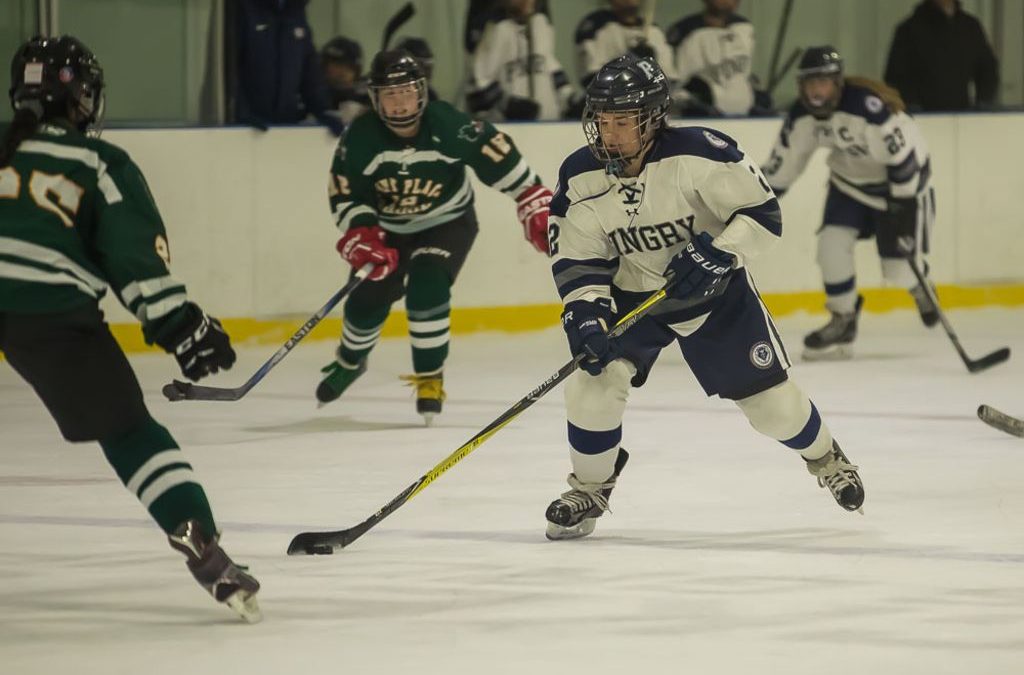
Mar 24, 2019 | Athletics, Eva Schiller
By Eva Schiller ’21
The girls’ ice hockey team, led by captains Clare Hall (VI) and Sophia Smith (VI), has powered through the season to finish with six wins and eleven losses. Despite having only thirteen members and facing large, competitive teams, the team has stayed resilient, and in the end, made it all the way to the MSU league semifinals. Although they unfortunately lost to Chatham-Madison, the team is new to the league, which makes their success in the tournament impressive nonetheless.
Perhaps more important than their record is their energy and how close they are as a team, both of which can be attributed to their relatively small size. “We’re always really supportive,” team member Anushka Agrawal states (IV). They are also very excited for success in the future. As Co-captain Clare Hall says, “Although the team was small this year and will be losing two seniors, we hope that many girls join next year and that the team has a successful season!”
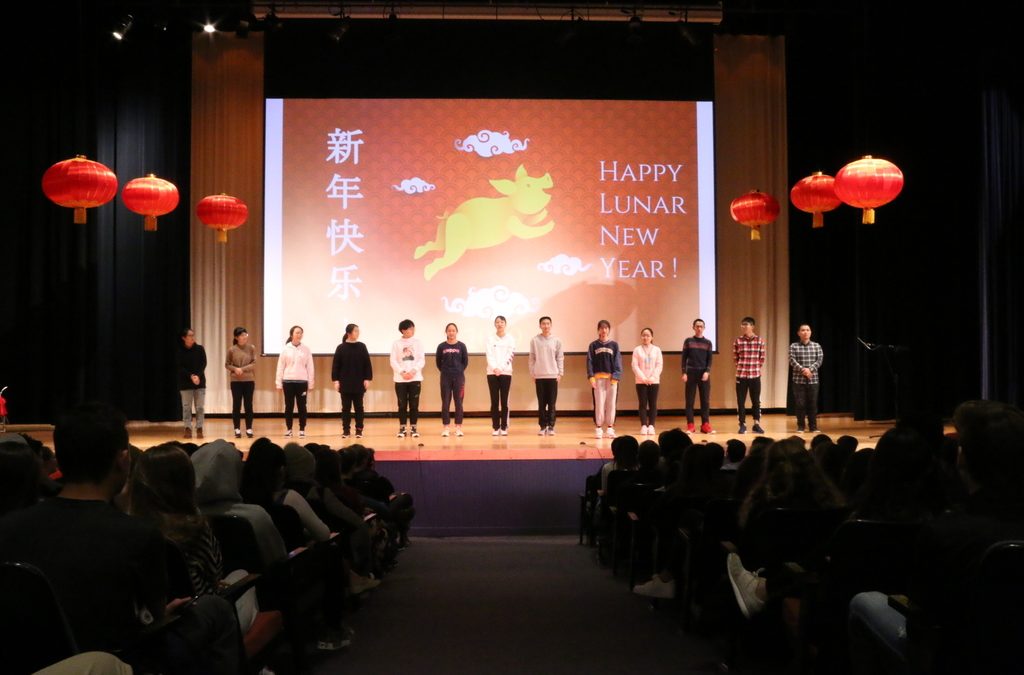
Mar 24, 2019 | Eva Schiller, School News
By Eva Schiller ’21
On the first day of Chinese New Year, Quzhou(衢州), China, was filled with warmth and gaiety. School and work went on break as people returned home to their families and celebrated the coming of the new year. But for twelve students from Quzhou Number 2 High School, the first day of Chinese New Year meant saying goodbye to their families and boarding a plane to the other side of the world.
On the evening of February 5th, these students landed in Newark, New Jersey and were welcomed by Ms. Yi Hao, Pingry Chinese teacher, and several Pingry host families. Over the next week, they explored foods, activities, and places that highlight American culture. On the Pingry campus, this included visiting the lower school, observing Chinese classes and speaking with the students, hiking to Pingry’s green campus features, and watching school sporting events. The twelve students and their English teacher even sang a beautiful medley of American and Chinese songs at the Lunar New Year assembly.
Outside of Pingry, the host families were tasked with planning their guest’s activities. These included, but were not limited to, shopping in New York City, skiing, visiting famous museums, and trying fro-yo and Chinese takeout. In fact, many of the students had a delicious taste of apple pie (an American classic!) during their stay. These activities were truly the highlights of the exchange, as the students got to “see the similarities and differences in American and Chinese teen culture,” according to Monica Chan (IV), one of the host students. By showing their guests how to eat toast (use your hands, not a fork), use Snapchat, and bowl, the hosts discovered the joy “of introducing someone to a new culture, and watching them grow as they try new things,” in the words of Guan Liang (IV).
Although the Chinese students are all studying English, the exchange also encouraged Pingry students to work on their Chinese skills and reach across language barriers to connect with their guests. Alex Strasser (VI) commented, “Hosting has been an amazing experience for me, and it has reinforced my desire to study Chinese language and culture in college.”
Although the Chinese students were only here for one week, they formed loving, lasting relationships with their host families. At the farewell dinner, each guest and host made an impromptu speech about their experiences, and how they would “remember it all, forever,” according to JiaYi, the guest of Eva Schiller (IV). Tears were shed by both hosts and guests during the event as they reminisced about the week and reminded one another to keep in touch. Many of the speeches also included a heartfelt thank-you to Ms. Hao and Mr. Jeff Jewett for their hard work and time spent planning.
After leaving Pingry, the students visited tourist spots in Washington D.C. and New York City, sending photos to their host families along the way. Monica Chan’s guest, Ming, described the exchange best: “Good food, good people, and I had a wonderful time!”
Mar 24, 2019 | Editorial, Opinion
By Rashida Mohammed ’19
The widely-known novel Huckleberry Finn by Mark Twain has recently been eliminated from Pingry’s American Literature curriculum. Additionally, Heart of Darkness by Joseph Conrad, which was on the book list for World Literature sent out this past summer, was not taught in any of the World Literature periods. This is following what seems to be a rising trend in the United States of removing books from English classrooms. Many complaints about the appropriateness of these texts or those similar often come from black parents (such was the case in The Duluth school district in Minnesota), black students (like those in Montgomery County, Pennsylvania), or the NAACP, which has labeled Huckleberry Finn’s use of the n-word over 200 times as offensive, a stance they’ve held since the 1950s.
In trying to understand these complaints, I thought perhaps that people felt uncomfortable with students reading what they considered to be a problematic piece of literature or were uncomfortable with students and teachers reading derogatory terms in a classroom setting. After some thought, I think that there is a common theme related to all these qualms about reading such books: the inability to embrace discomfort. This idea became better fleshed out after reading an interview with Jocelyn A. Chadwick, President of the National Council of Teachers of English, in which she said, “[Huckleberry Finn] goes where Americans really don’t want to go. We talk about race and racism and acceptance and inclusivity and equity…but we don’t really listen and engage in a real substantive conversation.”
In the past few years Pingry has seen progress on topics of race relations in the form of its affinity groups and Black Student Union. Between these groups and our many advisory meetings, SDLC-hosted events, and leadership trainings, several conversation norms have been impressed onto us as important skills in school and in life. One of these norms is to lean into discomfort. Regardless of why Pingry made the decision to alter the curriculum, I hope that leaning into discomfort doesn’t leave the English classrooms as a skill. I cannot emphasize enough that it is not okay to feel unsafe in a learning environment, but the ability to disagree with and analyze multiple perspectives, even if it’s one that you may find offensive, is vital. I hope every school that removes books like Huckleberry Finn from their curriculum considers this opinion.
Arguing that other works like The Secret Life of Bees and The Lord of the Flies could replace these novels and convey the same sentiment is valid, but we need to be careful with where we draw the line. Living in such a vocally polarized country, we are more grounded in this debate about race now more than ever. So, why not let the discussion start in the classroom?
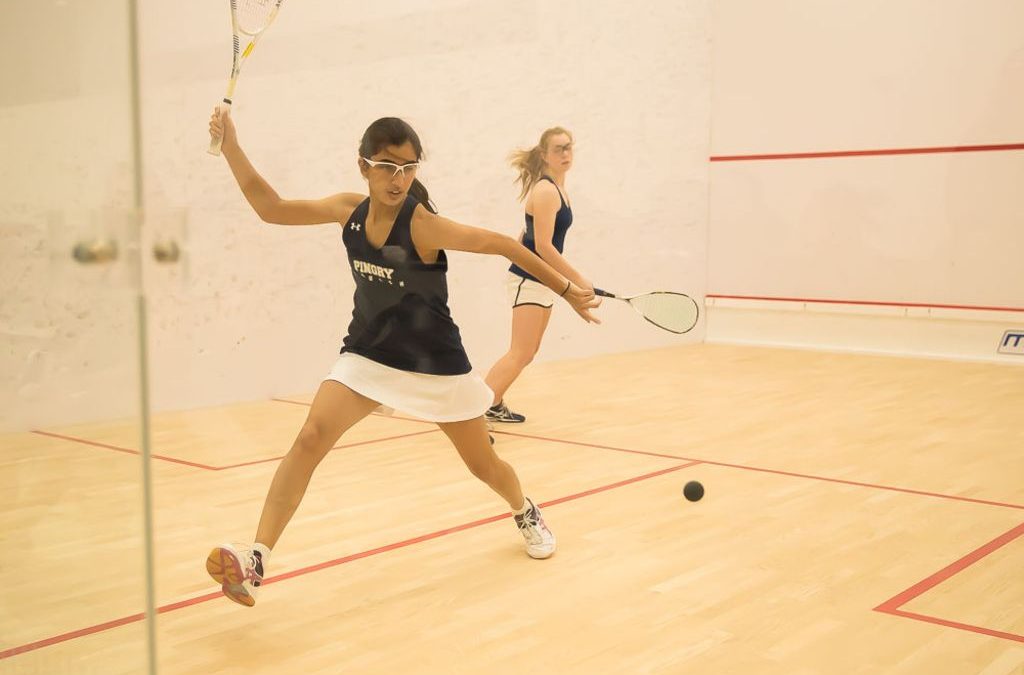
Mar 24, 2019 | Athletics
By Brian Li ’20
The girls’ squash team had a successful season with a final record of 6-6 and finished 16th at the U.S. Squash High School National Championships. Many of the team’s members also competed in the NJ High School Squash Championship on January 6th. Renee Chan (V) secured a victory for Pingry, Alisa Chokshi (VI) took second, and Olivia Hung (III) finished third.
Coaching a young team with lots of potential, Head Coach Tina Rix-Stout is excited to see how the team’s players develop and progress in the future. Although captains Chokshi and Aashiya Jaggi (VI) are graduating this year, the addition of four new freshmen on the team makes its future very promising.
Despite performing well over the season, the team recognized a few areas they need to improve in. In order to prepare for next season, Coach Rix said, “[As] a team, we need to work on our fitness and endurance. By doing this, the players will be more confident in their skills and able to withstand matches that are longer in duration and intensity.”
The team is excited to continue building a supportive culture and strong connections with each other. Coach Rix explained that “Everybody should put all their effort into the team to ensure we put our best foot forward at the start of the new season.”
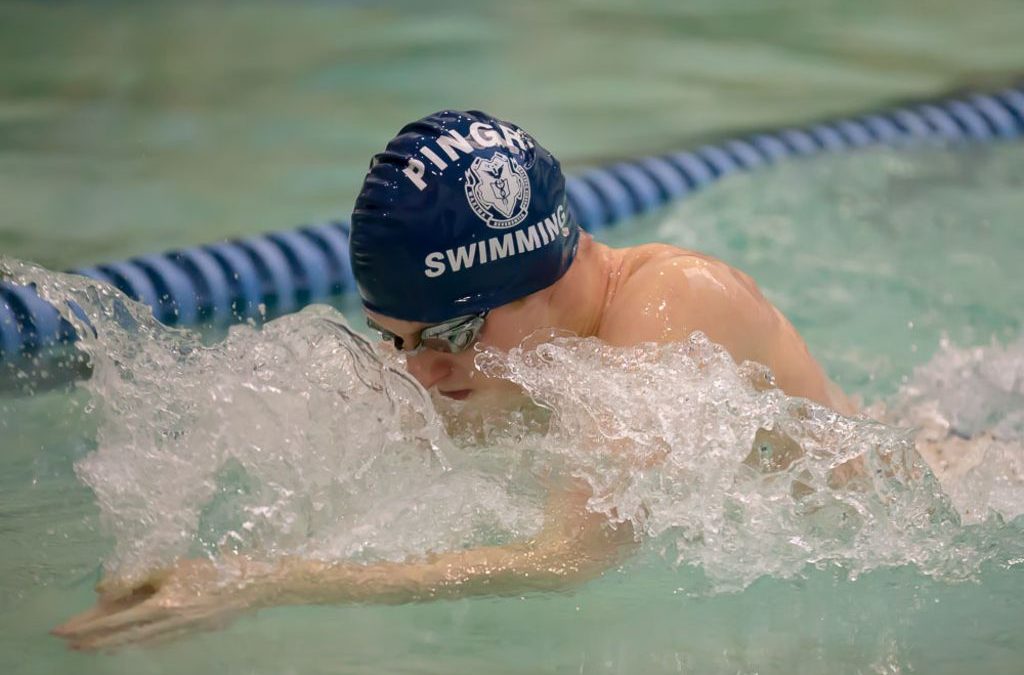
Mar 24, 2019 | Athletics
By Justin Li ’21
Pingry boys’ swimming has had yet another dominant season. Like last year, they’ve maintained an undefeated record, and, as senior captain Kevin Ma (VI) states, “Although we graduated an extremely strong senior class last year, we still managed to prove to everyone that we are the best team in the state.” The team’s commanding 109-61 win over Bridgewater, the next best team in the state, serves as evidence of their strength this year.
Their performance earned them a first place finish at the Skyland Conference Championship, where they claimed 17 top-six swims and placed first in every relay. They also won the Prep Championships against other strong teams, including Delbarton and Pennington. In addition to their success at meets, the team’s season was filled with record-breaking swims. Individually, Matt Fallon (IV) set both new school and pool records in the 200 meter IM, 200 yard IM, 400 meter freestyle, and 100 yard breastroke. Kevin Ma (VI) also broke the Skyland Conference record for the 50 yard free. As they head into the state tournament, they hope to continue their success and add yet another title to an already impressive season.
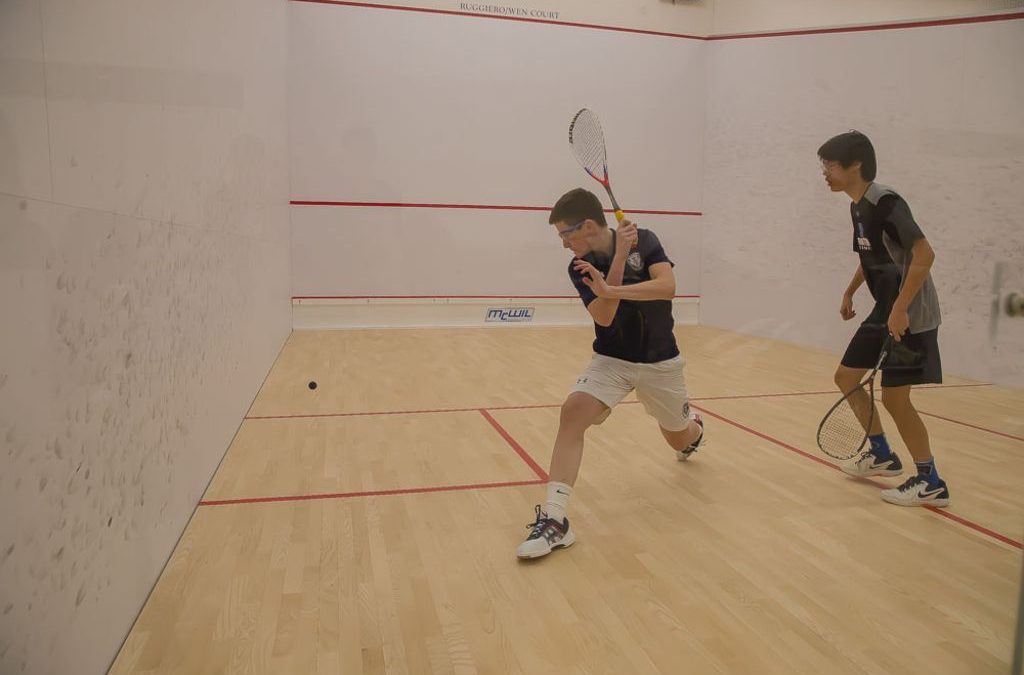
Mar 24, 2019 | Athletics
By Brian Li ’22
This year, the boys’ squash team had an excellent season and finished with a very strong record. The team also placed 17th at Nationals, becoming Division II National Champions in the process. Under the captainship of Jeffrey Xiao (VI) and Chris Zachary (VI), they went into every match with the determination to overcome all barriers and win.
Coached by Mr. Ramsay Vehslage, the team beat Lawrenceville 6-1, claiming the unofficial title of State Champions yet again. The team also performed exceptionally well at the High School National Championships in Hartford, Connecticut. Despite not qualifying for Division I this season, they put all their effort into the tournament and won Division II, beating some of the top schools in the country, including Choate Rosemary Hall and Phillips Andover. Mr. Vehslage commented, “The boys played with incredible heart all weekend … We’ve been working hard all season long, and it’s great to see the consistent effort paying off when it mattered the most.”
On January 6, the boys’ squash team competed in the New Jersey High School Squash Championship. The players had an impressive showing, with Chris Zachary placing second and Alex Chiang (V) finishing in third place.
Although seniors Xiao and Zachary are leaving this year, the team is looking forward to the arrival of new freshmen and hopes to continue competing at the highest level in the future.
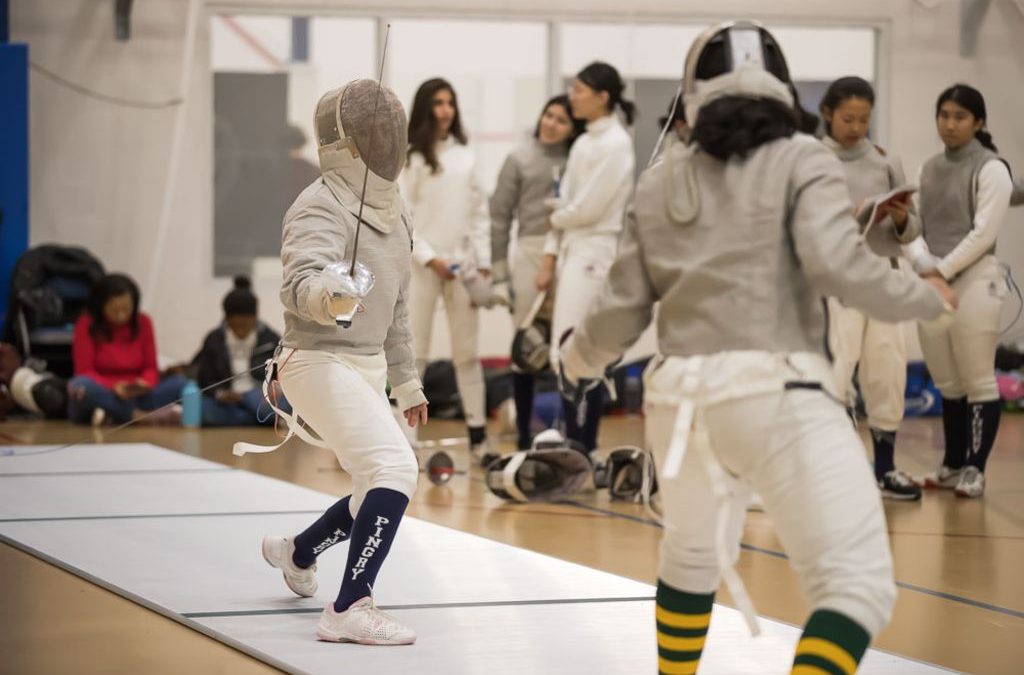
Mar 24, 2019 | Athletics
By Alison Lee ’20
The girls’ fencing team has performed strongly throughout the entire season. At the beginning of the season, they fenced in the Somerset County tournament; Captain Georgia Liu (VI) placed third and Alison Lee (V) placed second in their individual competitions.
Throughout the season, the team has improved with intense practice and private lessons. “I think that this season the team is very close, which is super nice. Even though the majority of the team is underclassmen, they do their best every practice/meet,” Liu says. One proud moment for the team was when they beat Watchung Hills 14-13.
The team also finished well at Districts, securing second as a team and qualifying for Sweet Sixteens. Though the Pingry team was seeded 10th, they fought 7th seed Bernards and lost with a close score of 12-15.
In addition, the épee squad placed first and the foil squad placed second. Both squads will fence in State Squads.
Four people qualified for district individuals, including Josie Alston (IV) and Ameera Ebrahim (IV). Two fencers, Jessica Lin (IV) and Alison Lee (V), also performed well enough to compete in state individuals.
Ashna Kumar (V) comments, “Considering some of the freshman girls are new to high school fencing or their weapon, what the team accomplished was extraordinary. I’m so proud of every single one of them, even the freshmen.”
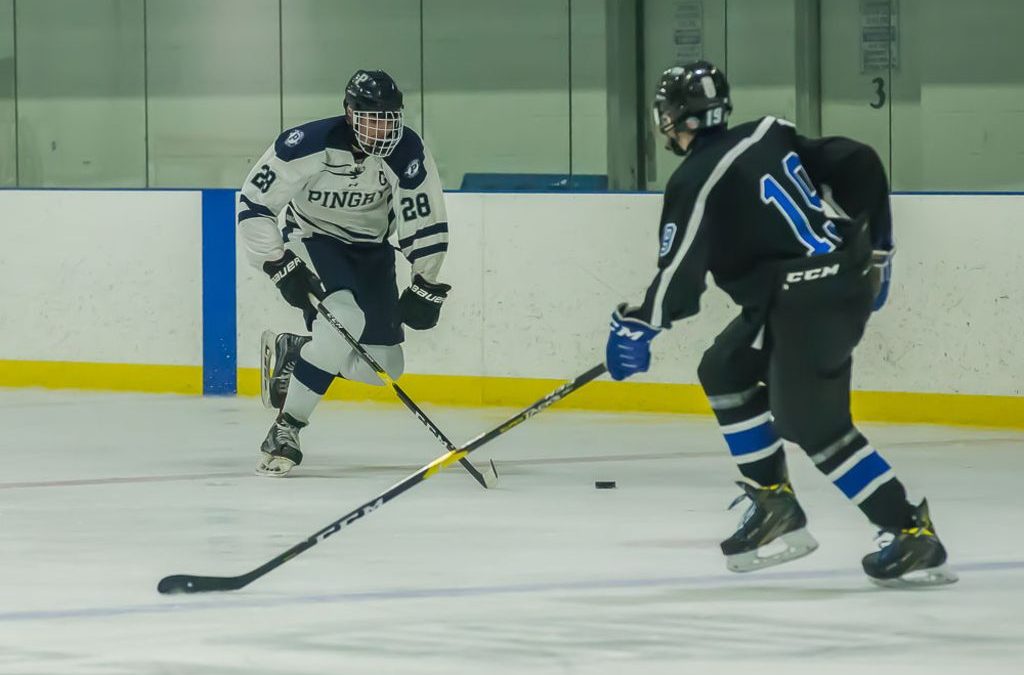
Mar 24, 2019 | Athletics
By Matt Lee ’20
The boys’ ice hockey team entered this season hungry for victory. After losing to Ridge in last year’s Skyland Conference Tournament finals, the team vowed to return this year and win. With that goal in mind, they had an extremely strong showing throughout the season, with an impressive winning record. Under the leadership of captain Matthew Keller (VI) and assistant captains Daniel Schnack (VI) and Michael Vessa (VI), the team is poised for success in the Conference and State Tournaments.
Their starting goalie, Kevin Parnham (IV), has led the team’s strong defense all season. With 5 shutouts and many crucial saves, he has clearly had a very successful season. Matt Keller has also been a driving force on defense. Daniel Schnack (VI), Joe Faccone (V), Eric Bush (IV), and Jared Kordonsky (IV) have been leading the attack, with each player scoring over thirty points, a rarity in high school hockey. In addition to these star players, the depth of the team has truly helped propel them to victories. Head Coach Scott Garrow said that the key to success this year was “depth up front and on defense,” which allowed the coaches to “put a lot of players on the ice and wear other teams down over the course of the game.”
Since the regular season is over, the playoffs are now the team’s focus. With all of the hard work and preparation that they have put in, Coach Garrow says the only thing left to do is “win a Championship.”
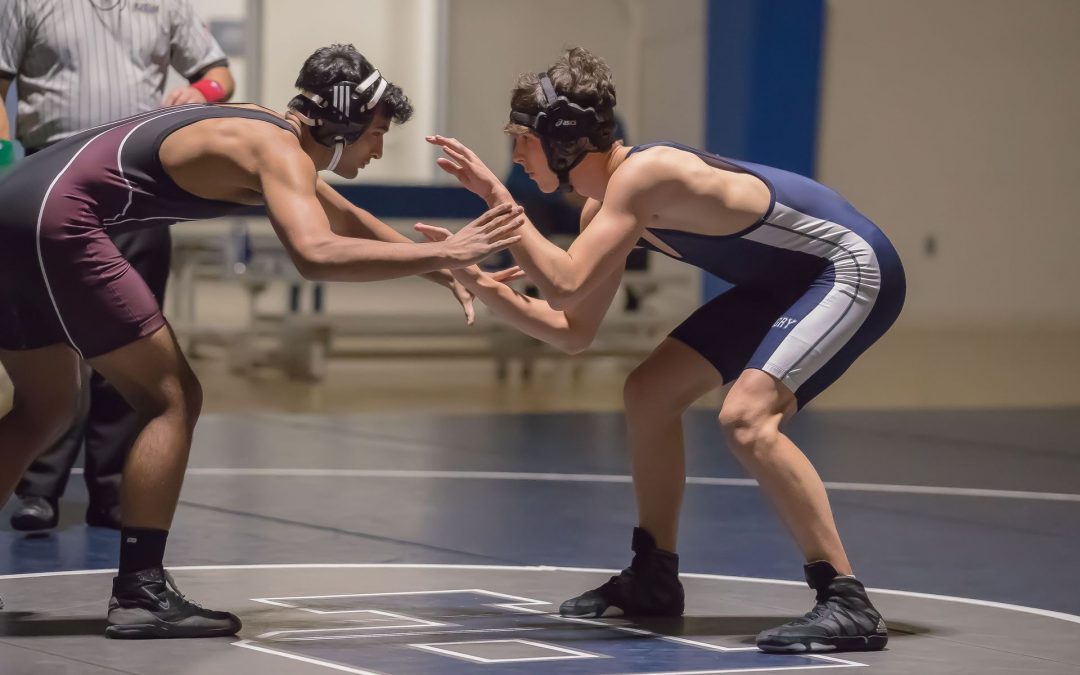
Mar 24, 2019 | Athletics
By Dean Koenig ’21
As the Pingry wrestling season approaches its end, the team prepares for some upcoming tournament play. Last year, Brandon Spellman (VI) was the only wrestler to make the State Tournament, and Coach George Sullivan says that he wishes “to expand on that this year.” Spellman has put together a fantastic final season, attaining a 27-4 record. In addition, he was the champion of the Pandy Leh tournament, the Hunterdon Central Invitational, and County Championships. He was even named the Outstanding Wrestler of the County Championships.
Zach Dobson (VI) was also a champion of the Pandy Leh tournament for his weight class and finished second at the Hunterdon Invitational and county championships. He finished the season with a 27-2 record.
The team experienced a series of injuries, but younger wrestlers were able to step up and fill in the gaps. Coach Sullivan said that “the team has battled and maintained a competitive spirit all season.” If this spirit is kept throughout the district tournament, the team could send more wrestlers to the regional and state tournaments. Heavyweight wrestler Ore Shote (IV) commended this year’s senior class: “they paved the way for what is to come.”
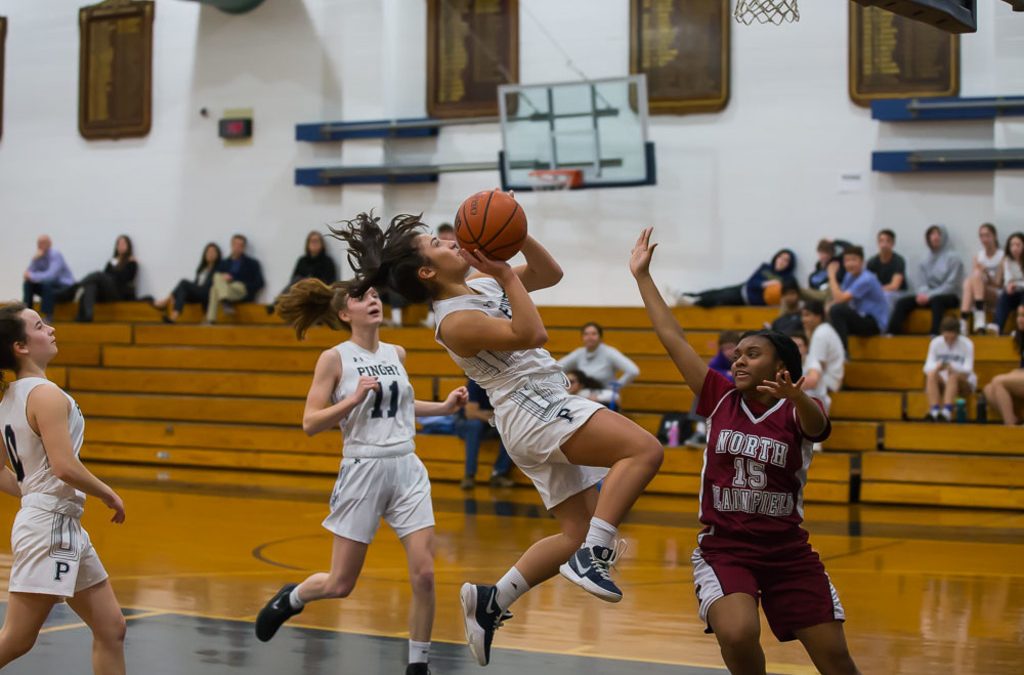
Mar 24, 2019 | Athletics
By Dean Koenig ’21
It took some time for the girls’ basketball team to find its momentum this season, but the girls became much more comfortable on the court by January. Starting guard Olivia Volpe (IV) explained that the team’s goal midway through the season was “to beat teams we lost to the first time we played them”; such teams included Bernards, Delaware Valley, and Voorhees, all of which Big Blue later beat. The second time Pingry played these teams, they beat Bernards by three points, Delaware Valley by one point, and Voorhees by one point. Evidently, the key difference between the first and second half of the season was Pingry’s ability to successfully finish tight games.
Volpe expressed the team’s excitement for the County and Prep Championships, saying, “We are looking forward to going as far as we can in the upcoming tournaments.” She also sees how far the team has come since its start: “We are playing our best basketball right now. I’m excited for our potential next year.”
Mar 24, 2019 | Editorial, Opinion
By Aneesh Karuppur ’21
Pingry is known for a lot of things; just head over to a website like College Confidential or NJ.com and you’ll find many different opinions and rankings of the school. People always seem to compare our academics to Newark Academy’s, or our athletics to Delbarton’s, or the Pingry experience to the Lawrenceville experience, but Pingry’s broad variety of club activities are rarely mentioned. Why aren’t clubs more prominently featured? After all, any college counselor will tell you that colleges value extracurriculars in addition to academics or athletics.
Pingry’s profile on Niche.com, which features rankings and information about nearly every K-12 school in the country, tells us an interesting story. Pingry earns a high A in every category on everything except – gasp – clubs! Pingry’s clubs earn a mere, shameful A- according to Niche, but no reasoning or justification is provided. Are Pingry clubs really so much less impressive than the other things the school has to offer?
The answer is no. Of course not! Pingry’s clubs are certainly high achieving– Pingry’s QuizBowl team, for example, has more trophies than can fit in Ms. Smith’s room, and the Model Congress club regularly collects gavels during trips.
But the impression that Pingry clubs stink seems to come from people’s reviews of the school. According to one anonymous Niche user, “I was not involved in many extracurricular activities at Pingry. In my experience, clubs and organizations are put on the backburner and academics are more valued. It seems to me that if a student is looking for extracurricular experience, they will participate in something outside of school.” Ouch.
But this user is not the only disgruntled person who is unsatisfied with Pingry’s clubs: “Great if the school cares about it” says another user. In general, the consensus seems to be that Pingry doesn’t put enough emphasis on clubs.
In a sense, this is true. Many clubs in Pingry are essentially autonomous, meaning they run without significant intervention from teachers or administration. This is especially true with clubs that don’t spend too much money.
Now, this is not necessarily a bad thing. But, what ends up happening is that clubs are running completely on individual student knowledge and initiative, which makes it difficult for the club to grow together because students have many other responsibilities to tend to. After a certain point, students cannot offer the same amount of knowledge that a dedicated coach or advisor can. However, the club’s advisors often have other responsibilities as well: advising plays, teaching students, coaching sports, running publications, and a whole host of other jobs that make it very difficult for them to put in the time needed. It simply doesn’t make sense for the club to expect its already burdened advisors to develop a level of understanding that is sufficiently greater than that of the students and help the club to grow.
Ridge High School has one of the top forensics programs in the country, in part because it has a dedicated coach who visits weekly to run the club meetings. Without that kind of teacher intervention, students are less motivated to join and, without enough students, the cost of a dedicated teacher becomes too high. It’s a vicious cycle of stagnation.
Even from a monetary perspective, the “let the kids deal with it” attitude doesn’t seem to work well. Without sufficient support, clubs won’t be able to reach their potential or win accolades for the school.
Pingry definitely supports its clubs in terms of facilities. Clubs (usually) have the tools and equipment that they need to function, but what is missing is that last link of a fully invested, dedicated, single-job teacher that would allow Pingry’s clubs to be as successful as the sports teams, at least in the eyes of the administration. Some clubs are now defunct because there was no advisor to continue their existence.
It is quite likely that other members of the community have brought up this suggestion in the past. Nonetheless, the idea is intriguing for future implementation, and could move Pingry’s club score from an A- to an A+.











